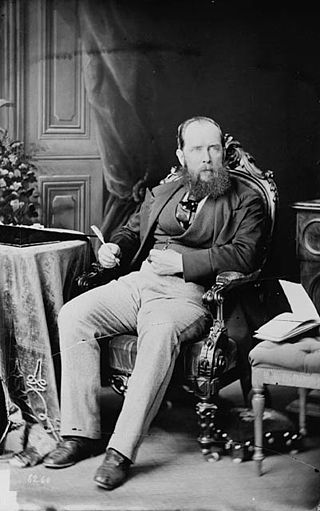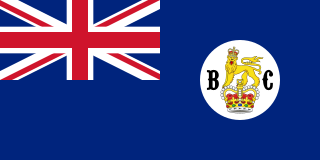This article needs additional citations for verification .(October 2018) |
Wymond Ogilvy Hamley (30 December 1818 – 14 January 1907) was an English-Canadian collector of customs and politician.
This article needs additional citations for verification .(October 2018) |
Wymond Ogilvy Hamley (30 December 1818 – 14 January 1907) was an English-Canadian collector of customs and politician.
Hamley was born in Bodmin, Cornwall, England, the third son of Vice Admiral William Hamley. R.N. He initially followed in his father's footsteps and briefly served in the Royal Navy, before retiring and joining the Imperial Civil Service. He got appointed collector of customs for the Colony of British Columbia through Sir Edward Bulwer-Lytton. Hamley arrived at Esquimalt on 12 April 1859, aboard the Thames City. [1] [2]
His role as collector of customs lead to Governor James Douglas to appoint him as a member of the Colonial Assembly of British Columbia in 1864. [3] In the united Colony of British Columbia, he was a member of the Legislative Council of British Columbia, [4] a position he held until 1871, [5] when the colony joined the confederation of Canada.
He remained as collector of customs in New Westminster to 1868, when the relocation of the capital required him to move to Victoria, but returned to the position after 1871. He retired after close to 30 years of service in December 1889. [1]
Hamley remained in Victoria until his death on 14 January 1907. [6] He was close friends with Peter O'Reilly, who arrived in Esquimalt on the same day but on a different ship.

Basutoland was a British Crown colony that existed from 1884 to 1966 in present-day Lesotho. Though the Basotho and their territory had been under British control starting in 1868, the Cape Colony was unpopular and unable to control the territory. As a result, Basutoland was brought under direct authority of Queen Victoria, via the High Commissioner, and run by an Executive Council presided over by a series of British Resident Commissioners.

John Robson was a Canadian journalist and politician, who served as the ninth premier of British Columbia.
The 1871 British Columbia general election was held from October to December 1871. Formerly a British colony, British Columbia became a province of Canada on July 20, 1871. An interim Cabinet was appointed by the Lieutenant Governor of British Columbia, and election writs for the first general election as a province of Canada were issued to choose 25 members of the first provincial legislature from 12 ridings. These ridings were:

Sir James Douglas was a Canadian fur trader and politician who became the first Governor of the Colony of British Columbia. He is often credited as "The Father of British Columbia." He was instrumental to the resettlement of 35 African-Americans fleeing a life of racial persecution in San Francisco who arrived in the province aboard the steampship Commodore in what later became known as the Pioneer Committee. In 1863, Douglas was knighted by Queen Victoria for his services to the Crown.

Sir Joseph William Trutch, was an English-born Canadian engineer, surveyor and politician who served as first Lieutenant Governor of British Columbia.

Hugh Nelson was a Canadian parliamentarian and the fourth Lieutenant Governor of British Columbia.

The Colony of Vancouver Island, officially known as the Island of Vancouver and its Dependencies, was a Crown colony of British North America from 1849 to 1866, after which it was united with the mainland to form the Colony of British Columbia. The united colony joined Canadian Confederation, thus becoming part of Canada, in 1871. The colony comprised Vancouver Island and the Gulf Islands of the Strait of Georgia.

The Colony of British Columbia was a British Crown Colony that resulted from the amalgamation of the two former colonies, the Colony of Vancouver Island and the mainland Colony of British Columbia. The two former colonies were united in 1866, and the united colony existed until its incorporation into the Canadian Confederation in 1871.

The Colony of British Columbia was a crown colony in British North America from 1858 until 1866 that was founded by Richard Clement Moody, who was selected to 'found a second England on the shores of the Pacific', who was Chief Commissioner of Lands and Works for British Columbia and the first Lieutenant-Governor of British Columbia. Prior to the arrival of Moody's Royal Engineers, Columbia Detachment, the Colony's supreme authority was its Governor James Douglas, who was the Governor of the neighbouring colony of Vancouver Island.

The British Columbia Provincial Police (BCPP) was the provincial police service of British Columbia, Canada, between 1858 and 1950.

John Sebastian Helmcken was a British Columbia physician who played a prominent role in bringing the province into Canadian Confederation. He was also the founding president of the British Columbia Medical Association.

Thomas Wilson Paterson was a Canadian railway contractor, politician, and the ninth Lieutenant Governor of British Columbia.

The Legislative Council of British Columbia was an advisory body created in 1867 to the governor of the "new" Colony of British Columbia, which had been created from the merger of the old Colonies of Vancouver Island and British Columbia. The new colony, like its predecessors, did not have responsible government, and while its debates and resolutions carried considerable weight, executive power remained in the hands of the governor, who at the time of the council's founding was Frederick Seymour.

The Legislative Assembly of Vancouver Island, sometimes House of Assembly of Vancouver Island, was the colonial parliamentary body that was elected to represent voters in the Colony of Vancouver Island. It was created in 1856 after a series of petitions were sent to the Colonial Office in London protesting the Hudson’s Bay Company’s proprietary rule over the colony. It was the first elected assembly in British North America west of Ontario. Although at first only handful of colonists met the voting requirement, and most of those that did were tied to the HBC, the franchise was gradually extended, and the assembly began to assert demands for more control over colonial affairs, as well as criticize colonial governor Sir James Douglas's inherent conflict of interest as both governor and Hudson Bay Company's chief factor.
Charles Edward Pooley was a lawyer and political figure in British Columbia, Canada. He represented Esquimalt in the Legislative Assembly of British Columbia from 1882 to 1906 as a Conservative.

The Colony of New Zealand was a Crown colony of the United Kingdom of Great Britain and Ireland that encompassed the islands of New Zealand from 1841 to 1907. The power of the British government was vested in the Governor of New Zealand, as the representative of their monarch. The colony had three capitals: Old Russell in 1841; Auckland from 1841 to 1865; and Wellington, which was the capital until the colony's reorganisation into a Dominion, and continues to be the capital of New Zealand till the present day.
The Legislative Council of British Columbia held its second election in 1869. BC was a colony formed by the union of the colony of Vancouver Island and the colony of British Columbia..
Cornish Canadians are Canadians of Cornish descent, including those who were born in Cornwall. The number of Canadian citizens of Cornish descent cannot be determined through census statistics, though speculative estimates place the population as high as 20,000.
The 1895 Birthday Honours were appointments by Queen Victoria to various orders and honours to reward and highlight good works by citizens of the British Empire. The appointments were made to celebrate the official birthday of The Queen, and were published in The Times on 25 May 1895 and in The London Gazette on 25 May 1895 and on 11 June 1895.
Hamley may refer to:
April 13th - ship Thames City, Glover, London.